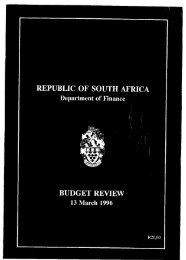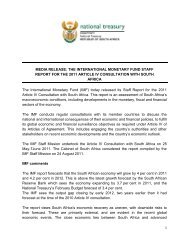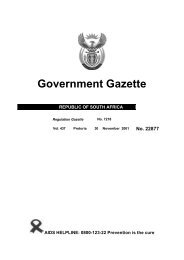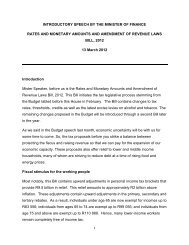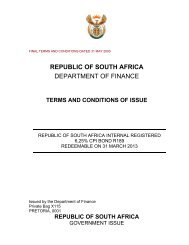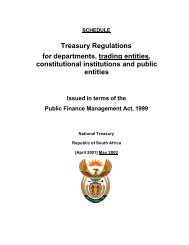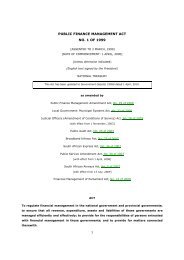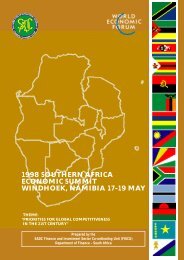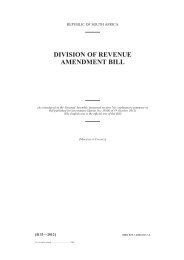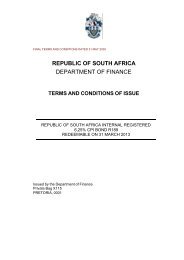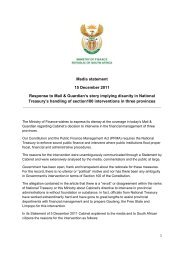Annual Performance Plan Jaarlikse ... - National Treasury
Annual Performance Plan Jaarlikse ... - National Treasury
Annual Performance Plan Jaarlikse ... - National Treasury
Create successful ePaper yourself
Turn your PDF publications into a flip-book with our unique Google optimized e-Paper software.
The rationalisation of special schools in the province in order to promote accessibility of learners experiencing barriers<br />
to learning is a priority. The strengthening of special schools/resource centres is critical in order to provide specialised<br />
support to mainstream and full service schools in conjunction with the district-based support teams. This priority is also<br />
linked with the national Inclusive Education field-testing project in the three nodal zones of the province and includes the<br />
upgrading of capacity to provide specialised services to learners with high intensity support needs, and upgrading of<br />
physical facilities of schools in order to improve accessibility.<br />
Progress analysis<br />
Currently there are 14 199 learners in the 67 special schools of which seven offer the FET curriculum. The learner enrolment<br />
of the Cape Academy of Mathematics, Science and Technology was increased to 274 learners and the curriculum expanded<br />
to Grade 12. Two science laboratories were inaugurated and final hostel facilities were upgraded. There are currently 274<br />
learners (Grade 10 to 12) at the Academy.<br />
Owing to the great demand for placement of learners at Schools of Skills, two new schools have been established, namely<br />
the Mitchell’s Plain School of Skills and Siviwe School of Skills in Gugulethu.<br />
The Department of Culture Affairs and Sport and the WCED, jointly established the Western Cape Sports School in Kuils<br />
River.<br />
Training of personnel from youth centres and the support services at EMDCs in skills for dealing with challenging behaviour,<br />
and training of personnel as facilitators of youth developmental programmes is ongoing. Facilitators of youth developmental<br />
programmes for the Mapping the Future Programme and Drug Information Programme were trained in all EMDCs. EMDCsupport<br />
staff and personnel from youth centres were trained in therapeutic skills courses i.e. restorative interviewing,<br />
restorative group intervention, drug counselling and dealing with the sexual offender. A total of 631 staff members<br />
participated in the training programmes.<br />
Minimum standards for special education services for learners at-risk have been approved and distributed to EMDCs for<br />
implementation. The aims of these standards are to ensure that services are effective and efficient, that the principles of the<br />
SA Constitution, other legislation and international instruments (UN Convention on the Rights of the Child) are upheld as well<br />
as to identify delivery challenges and building the capacity and resources needed to develop the schools.<br />
Analysis of constraints and measures planned to overcome them<br />
The current provisioning in the special school sector is inadequate to accommodate the vast number of learners<br />
experiencing barriers to learning referred to the special schools. This results in waiting lists at the existing special schools.<br />
The envisaged rationalisation of special schools has as an objective to improve service delivery and accessibility in order to<br />
accommodate more learners. Although, in the short term, the availability of sufficient funding and additional CS-educator<br />
posts for expanding the capacity of special schools is a challenge, ways of addressing this concern will be deliberated in the<br />
medium to long term.<br />
Learners manifesting serious emotional, behavioural and psychiatric barriers to learning cannot be accommodated at the<br />
existing special schools nor at youth centres. These educational institutions do not have the capacity to provide the intensive<br />
level of support and treatment required. The service delivery models of the Departments of Health and Social Development<br />
are similarly inadequate to provide these specialised services. As a result these unfortunate learners cannot access the<br />
curriculum effectively nor find appropriate care and therapeutic programmes. Some learners come into conflict with the law<br />
as a result of the lack of services and are criminalized in the process and then referred in terms of the Child Care Act, 1983<br />
and the Criminal Procedures Act, 1977 to youth centres and special youth centres respectively. Discussions with the relevant<br />
sister departments in order to address this gap in service delivery is envisaged.<br />
<strong>Annual</strong> <strong>Performance</strong> <strong>Plan</strong> 2007/08 – 2009/10<br />
59



